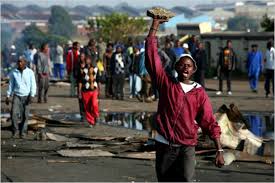Beyond borders: Africa needs peaceful coexistence

We have seen our fellow women in South Africa take part in the looting and killing of helpless fellow Africans. What example are they setting for the South African girl-child?
“…I do not come from Ghana I was only born there;I do not come from Nigeria neither do I come from Zimbabwe my soul was only conceived there. I do not come from South Africa; I do not come from Egypt, my spirit was only programmed there. I do not come from Madagascar neither do I come from Libya my hair was only textured there, I do not come from Rwanda or the Expansive Sahara my structure was only geometricized there, I do not come from the Congo, I do not come from Ethiopia my color was only mixed there….I hail from the over 50 states on the continent, I come from Africa, Africa is my Country…” Extracted from ‘Pharaonic Eagle’, poem by Prof. Atukwei Okai
Africa has witnessed unprecedented human rights violations and catastrophes, ranging from massive terrorist attacks that have claimed many innocent lives, to Ebola outbreaks in West Africa whose stigma is still being felt to date. The wars and conflicts in the Horn of Africa- Somalia -the Great Lakes Region, most recent being DRC, CAR, and South Sudan where many lives have been lost; massive loss of lives crossing the Mediterranean in pursuit of employment; colonization of the peoples of Sahrawi Democratic Republic (Western Sahara), the worst and most recent being the recent xenophobic attacks in South Africa; all of which demonstrate the magnitude of the fragility of our societies.
Unfortunately, when violence breaks out such as the xenophobic attacks that have occurred in the past few days in South Africa, it is the women and children who suffer the most although their plight is rarely highlighted. It’s a common trend that during such situations women’s sexual and reproductive rights are violated through rape and other forms of sexual abuse. As if that is not enough given the role of women as care takers they are the ones who bear the biggest burden of care during such crisis.
Our foremothers Jeane Martin Cisse, Gertrude Mongella, Mabel Dove, Ruth Botsio, Ama Nkrumah, Ramatu Baba, Sophia Doku and Dr. Evelyn Amarteifio Maria Ruth Neto and others must be disappointed at the legacy we are building today. After years of struggle and self -sacrifice to free the African people, we ironically are enslaving our very own in ways that are incomparable to the era of colonialism.
Long before the formation of women’s organizations, women in South Africa played a critical role in the struggle against apartheid with the first mass passive resistance campaign being in early 1912. This was probably the first mass passive resistance campaign. Indian women encouraged Black and Indian miners in Newcastle to strike against starvation wages. Despite the fact that women in South Africa have never constituted a homogenous group at many times in the struggle, women of all races and classes worked together, as can be seen in the formation of the Garment Workers Union in 1928 and FEDSAW in 1954. Through the common experiences shared and other interests women have always united as manifested through the support rendered by empowered women in many other African countries to South Africans especially women who for many years were marginalized and disempowered by apartheid. We have seen our fellow women in South Africa take part in the looting and killing of helpless fellow Africans. What example are they setting for the South African girl-child?
As a Pan-African feminist organization, AMwA is not only horrified by the xenophobic attacks in South Africa but rather confronted with underlying questions of how do we create societies that are able to embrace and respect human differences without suppressing human freedoms and rights? Secondly how do we begin to tackle the root causes of human rights abuses rather than deal with the symptoms? The fact that South Africa has had a number of xenophobic attacks with the worst having been in 2008 where 63 people lost their lives tells us that there is more to the attacks than utterances made by the Zulu King Goodwill Zwelithini and/ or claims that foreigners have taken up jobs of Southern Africans.
There is no doubt the Africa we want is not and should not be what we are continuing to witness today. As leaders we are challenged to rethink, strategize and begin to walk the talk. We have unprecedented laws and policy frameworks that if seriously implemented would go a long way in tackling Africa’s multifaceted problems especially poverty being the source of many of the evils we are witnessing today. The ongoing human rights violations are unbecoming and we cannot continue to let such inhuman acts prevail in our societies.
Therefore AMwA strongly condemns the recent xenophobic attacks in South Africa and calls;
a) For a united Africa, working together in harmony and peace for the true transformation of the African continent
b) On the government of South Africa to strengthen and provide security to all people in South Africa especially women, girls and children. And bring all the perpetrators of these attacks to book.
c) The African Union and SADC to quickly intervene and support the South African government in restoring peace security and unity among the people in South Africa
In Sisterhood
Akina Mama wa Afrika
